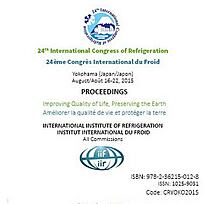
Document IIF
Développement et étude de cas relatifs à un système de régulation total optimal pour des sources de chaleur.
Development and case study on total optimal control system for heat sources.
Numéro : pap. n. 754
Auteurs : YAMADA K., MURASAWA I.
Résumé
Because Japan is consuming a lot of energy and most of energy supply id depending on other countries, more efficient energy saving technology is required. Energy consumption of industrial and service sections in Japan account for about 60% of the total energy consumption, and about 30% of the consumption in these sections is consumed by building heat source system. "Total optimal control system for heat sources" (hereinafter referred to as "TOCS") have been developed, and it can reduce energy consumption to 50% or less. There are many energy saving systems, such as heat recovery system producing cold and hot heat simultaneously, cooling towers using outside air as a cooling heat source without chilled water during the free cooling operation and refrigerators with inverters working efficiently during the partial loading operation. But in such systems, energy efficiency changes according to the amount of required cool and warm heat and condition of outside air because all instruments of heat source system is connected. By adopting the "TOCS", it can operate them co-ordinately to maximize the energy efficiency.
Documents disponibles
Format PDF
Pages : 6 p.
Disponible
Prix public
20 €
Prix membre*
Gratuit
* meilleur tarif applicable selon le type d'adhésion (voir le détail des avantages des adhésions individuelles et collectives)
Détails
- Titre original : Development and case study on total optimal control system for heat sources.
- Identifiant de la fiche : 30015531
- Langues : Anglais
- Source : Proceedings of the 24th IIR International Congress of Refrigeration: Yokohama, Japan, August 16-22, 2015.
- Date d'édition : 16/08/2015
- DOI : http://dx.doi.org/10.18462/iir.icr.2015.0754
Liens
Voir d'autres communications du même compte rendu (657)
Voir le compte rendu de la conférence
Indexation
-
Performance evaluation of an indirect evaporati...
- Auteurs : ZEOLI A., LEMORT V.
- Date : 2022
- Langues : Anglais
- Source : 2022 Purdue Conferences. 19th International Refrigeration and Air-Conditioning Conference at Purdue.
- Formats : PDF
Voir la fiche
-
A study on the heat pump system for removing wh...
- Auteurs : ROH C., LEE G., LEE B., WANG E. S., BAIK Y. J., SHIN H.
- Date : 31/08/2021
- Langues : Anglais
- Source : 13th IEA Heat Pump Conference 2021: Heat Pumps – Mission for the Green World. Conference proceedings [full papers]
- Formats : PDF
Voir la fiche
-
Application of multipurpose heat pumps in museu...
- Auteurs : SCHITO E., CONTI P., TESTI D.
- Date : 15/05/2023
- Langues : Anglais
- Source : 14th IEA Heat Pump Conference 2023, Chicago, Illinois.
- Formats : PDF
Voir la fiche
-
A R744 transcritical system with heat recovery ...
- Auteurs : COLOMBO I., JORDAN L., MAIDMENT G., et al.
- Date : 29/03/2010
- Langues : Anglais
- Source : 1st IIR International Conference on Sustainability and the Cold Chain
- Formats : PDF
Voir la fiche
-
Cold energy: the refrigeration system with the ...
- Auteurs : ASCANI M.
- Date : 12/06/2015
- Langues : Anglais
- Source : Le ultime tecnologie del freddo e del condizionamento. Atti del 16° Convegno Europeo: June 12-13, 2015, Milano, Italia.
- Formats : PDF
Voir la fiche
